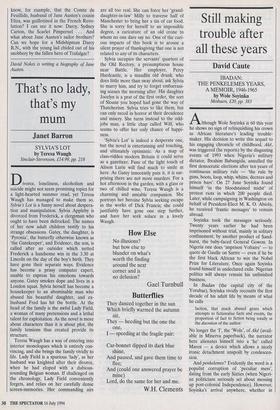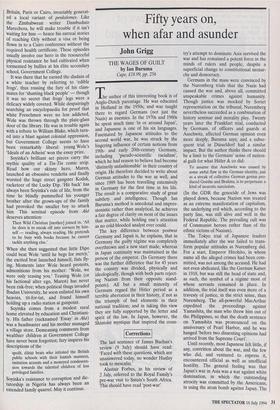Still making trouble after all these years
David Caute
IBADAN: THE PENKELEMES YEARS, A MEMOIR, 1946-1965 by Wole Soyinka Methuen, £20, pp. 383 Although Wole Soyinka is 60 this year he shows no sign of relinquishing his crown as African literature's leading trouble- maker. His decision to write this sequel to his engaging chronicle of childhood, Ake, was triggered (he reports) by the disgusting events of 1993 when Nigeria's military dictator, Ibrahim Babangida, annulled the first democratic elections after ten years of continuous military rule — 'the rule by guns, boots, loop, whip, whims, decrees and prison bars'. On 27 June Soyinka found himself 'in the bloodstained midst' of protest riots in which 200 people died. Later, while campaigning in Washington on behalf of President-Elect M. K. 0. Abiola, he received 'frantic messages' to remain abroad.
Soyinka took the messages seriously. Twenty years earlier he had been imprisoned without trial, mainly in solitary confinement, by another product of Sand- hurst, the baby-faced General Gowon. In Nigeria one does 'imprison Voltaire' — to quote de Gaulle on Sartre — even if he be the first black African to win the Nobel Prize for Literature. Once again Soyinka found himself in undeclared exile. Nigerian politics will always remain his unfinished business.
In lbadan (the capital city of the Yorubas), Soyinka vividly recounts the first decade of his adult life by means of what he calls
faction, that much abused genre which attempts to fictionalise facts and events, the proportion of fact to fiction being totally at the discretion of the author.
No longer the 'I', the `Wole', of Ake (avail- able in Minerva paperback), the narrator here alienates himself into a 'he' called Maren — a device which allows a nicely ironic detachment unspoilt by condescen- sion.
And penkelemes? Evidently the word is a populist corruption of 'peculiar mess', dating from the early Sixties (when Nigeri- an politicians seriously set about messing up post-colonial Independence). However, Soyinka's arrival anywhere, whether in Britain, Paris or Cairo, invariably generat- ed a local variant of penkelemes. Like the Zimbabwean writer Dambudszo Marechera, he will make trouble if it isn't waiting for him — hence his surreal stories of reaching Orly without a visa or being flown in to a Cairo conference without the required health certificate. These episodes usually involve our hero in the resourceful physical resistance he had cultivated when tormented by bullies at his elite secondary school, Government College.
It was there that he earned the disdain of a white teacher by referring to 'edible frogs', thus rousing the fury of his class- mates for 'shaming black people' — though it was no secret that frogs' legs were a delicacy widely coveted. While despairingly searching an encyclopaedia for proof that white Frenchmen were no less addicted, Wole was thrown through the plate-glass door of the library. He was in trouble again with a tribute to William Blake, which turn- ed into a blast against colonial oppression, but Government College seems to have been remarkably liberal: young Wole's 'Ideals of an Atheist' won the essay prize.
Soyinka's brilliant set pieces carry the mythic quality of a Tin-Tin comic strip. Read how our skinny hero, Maren, launched an obsessive vendetta and finally worsted the huge street gangster Kodak, racketeer of the Lucky Dip. 'Hit back' has always been Soyinka's rule of life, from the time he blindly pummelled his younger brother after the grown-ups of the family had provoked the smaller boy to attack him. This seminal episode from AM deserves attention:
Then Wild Christian [mother] joined in. 'All he does is to sneak off into corners by him- self — reading, always reading. He pretends to be busy with books because he cannot tackle anything else.'
When she then suggested that little Dipo could beat Wole 'until he begs for mercy,' the excited brat launched himself, fists fly- ing. Moments later Wole heard protests, admonitions from his mother: Wole, we were only teasing you.' Teasing Wole (or his factional alter ego, Maren) has never been risk-free; when political thugs invaded Ibadan University, he soon enlisted his own heavies, tit-for-tat, and found himself holding up a radio station at gunpoint. Soyinka comes from a modest rural home elevated by education and Christiani- ty. His father (nicknamed 'Essay' in Ake) was a headmaster and his mother managed a village store. Demeaning comments from wealthier children at Government College have never been forgotten; fury inspires his descriptions of the
spoilt, elitist brats who infested the British public schools with their loutish manners, imitation accents and a moneyed condescen- sion towards the talented children of less privileged families.
Soyinka's resistance to corruption and dic- tatorship in Nigeria has always been an extended family quarrel. May it continue.



















































 Previous page
Previous page